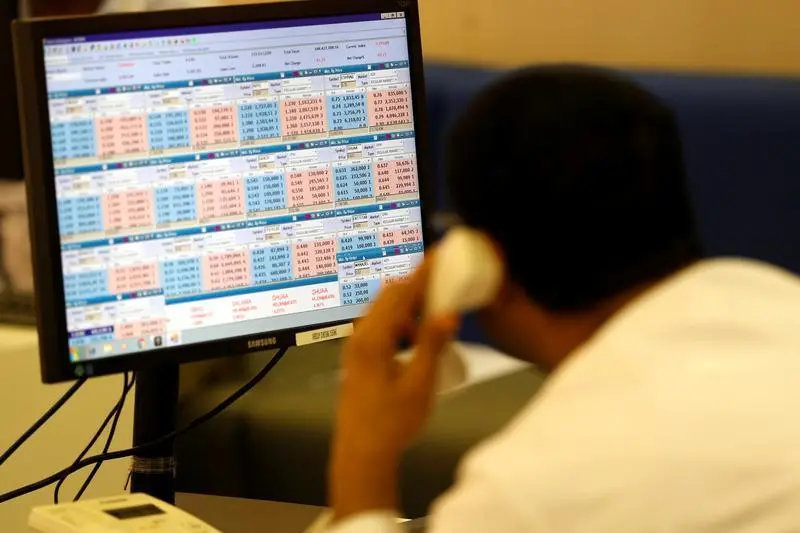PHOTO
UAE-based shipping companies could see their stocks rise as their global counterparts struggle to deal with the fallout from the ongoing Red Sea crisis.
Both Dubai-listed Gulf Navigation (GULF NAV) and Abu Dhabi–listed Al Seer Marine saw share price growth in 2023, as did Qatar Stock Exchange–listed Qatar Navigation towards the end of the year.
Last Friday, LSEG data showed GULF NAV’s stock at AED 6.82, up from AED 1.30 in one year, an increase of 424%.
Last week, the European Commission’s vice president, Valdis Dombrovskis, warned that Red Sea shipping disruption, which has been unfolding since the start of the Israel–Hamas conflict, could cause Eurozone consumer prices to surge and economic growth to slow.
So far, the GCC states have yet to receive a similar warning. Fitch’s 2024 outlook said conflict escalation was a risk for the Middle East region as a whole and that the Red Sea attacks would be a step in escalation, yet they would not impact GCC ratings.
S&P has warned of a risk of closure of the Strait of Hormuz; as it is their primary export route, it would have a significant effect on rated Qatari entities exposed to oil and gas.
Bhavik Mehta, Deputy Head of Research, Investment Products, at Century Financial, said the UAE’s shipping companies have not yet seen an impact. “At this point of time, we are given to understand the majority of the attacks that have happened are on ships which are primarily destined for ports in Israel,” he said, noting that the attacks were on containers from China, Singapore, the US and the UK.
If the crisis escalates further, that could tip the balance in favour of Gulf shipping stocks, he said, though admitting that the scenario was speculative. “Imagine a scenario where the entire Red Sea [and] the Suez Canal [are] blocked for Western containers, would there be an opportunity for these local carriers because all these are from Arab countries?”
Nils Haupt, a spokesman for Hamburg-based Hapag-Lloyd, which bought Gulf-based United Arab Shipping Lines seven years ago, said the period from 2010 to 2018 had been rough, as a global shipping recession had gripped the industry. Then came the advent of the post-COVID container boom, which Haupt described as “an exceptional situation for shipping lines”.
The industry is entering rough waters, he said. In response to such changes, Hapag Lloyd, the world’s fifth largest container shipping company, announced an alliance with the second largest, Denmark-based Maersk, in mid-January, to benefit from efficiencies in each other’s networks.
“An average container from the Far East to Europe would be $1,500 before COVID. In the last months we have seen rates of $800,” Kaupt said.
He described the Red Sea incidents as “a special situation”.
Emirates-based shipping companies, which were previously under the radar, are sparking interest among local analysts.
GULF NAV, listed on Dubai Financial Market in 2007, foundered in the early phase of the pandemic after disaster struck in September 2020 and its vessel Gulf Livestock 1 sank in a typhoon en route from New Zealand to China, with the loss of 41 crew as well as 6,000 cattle.
Within days, the company named a new chairman and board and set about restructuring. It has frequently made headlines for acquisitions or attempted acquisitions and recently announced a deal with Wings Logistics Holding to use drone technology.
Yusuf Mansawala, Chief Market Analyst for CPT Markets in Dubai, said GULF NAV’s net income was very negative during the initial COVID year, but the company recently issued a sukuk giving it access to fresh capital, and it became profitable in 2023 after more than 10 years of losses.
“The marine sector post-COVID has shown a significant improvement in terms of transportation of cargo, commodities and livestock,” he said.
In addition to the share price rise, GULF NAV’s net profit in 2022 Q3 was AED 1.9 million ($517,000), growing significantly to AED 35 million a year later.
Diversification
“The company has many different segments: marine transportation, oil transportation, chemical transportation, livestock, hazardous material transportation, hazardous, vessel shipping,” Mansawala said, explaining that the company can thus earn profits from multiple streams.
Citing continuous asset growth and reduced losses, he said, “Earlier in 2020, nobody was looking to invest, but gradually it has restructured, and trust is growing.”
Century’s Mehta said government authorities are interested in leveraging the sector, with the UAE’s location and broader access to both East and West boding well for shipping companies.
However, he sees Al Seer Marine, which is 75.9%-owned by Abu Dhabi holding company IHC and listed on the Abu Dhabi Securities Exchange (ADX), as the better play for the longer term.
It is also diversified, he said, encompassing a range of operations, including rental yachts, bigger ships and recently acquired new vessels carrying cargo across the entire Middle East and Red Sea routes.
Its share price rose consistently through most of 2023, though it did begin to fall marginally at the end of the year.
However, more corporate restructuring of the IHC group of companies could mean dilution of shares or follow-on offers for the shareholders, Mehta said.
(Reporting by Imogen Lillywhite; editing by Seban Scaria)




















